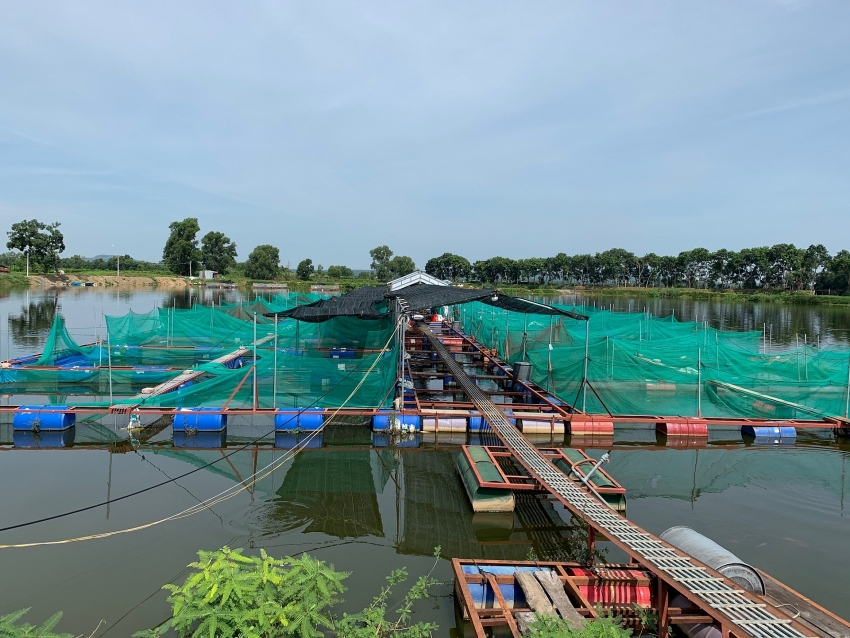Fresh Cargill study shows growing consumer support for farmers
Consumer recognition for the challenges and expectations farmers face grew amid the COVID-19 pandemic, as processing and transportation bottlenecks, especially in the protein industry, stretched the global food supply. In the latest Feed4Thought survey, Cargill found nearly one-third of consumers in the US, Brazil, Vietnam, and Norway have a renewed appreciation for animal agriculture.
 |
| Cargill's study shows farmers currently tend to apply state-of-the-art technologies at their fish farms |
“Farmers and ranchers have faced tremendous pressures caused by COVID-19 supply chain disruptions. And those pressures came on top of the multitude of challenges farmers already faced as they worked to feed the world in a safe, responsible, and sustainable way,” said David Webster, president of Cargill Animal Nutrition and Health. “When consumers experienced bare shelves at grocery stores, they were reminded of the critical role livestock and aquaculture farmers play in global food security.”
Cargill found 71 per cent of consumers express concerns about the pandemic’s disruption of the food system, and that two in three consumers acknowledge an increased pressure on animal farmers to supply safe, affordable protein since COVID-19’s onset.
These new challenges have not, however, deterred consumers’ faith in farmers: an overwhelming majority of consumers (84 per cent) indicated they were generally confident in farmers to meet demand and feed growing populations.
More than half of consumers indicate they are appreciative of farmers, with one-third saying that their perceptions have improved as compared to pre-pandemic. This high confidence and increased appreciation toward farmers suggest that COVID-19 may be acting as a catalyst in strengthening the relationship between consumers and farmers.
With this also comes consumers’ growing recognition of farmers’ roles and responsibilities. Beyond the critical role of feeding the world, consumers also see farmers as stewards of the earth’s natural resources (47 per cent), animal care experts (42 per cent), technologically savvy (21 per cent), and professional businesspeople (20 per cent).
“On a day-to-day basis, farmers play multiple roles,” Webster said. “They work to keep their animals healthy and free of disease, protect the earth’s resources, and manage their operations sustainably, provide employment, and run a profitable business.”
The study suggests respondents believe technology can help farmers address the challenges they face. Of those surveyed, 29 per cent would like to see farmers prioritise technology that improves animal health and wellbeing, while 28 per cent would like to see technology that improves overall food safety.
Technology and innovation continue to help farmers overcome challenges.
Real-time scans in poultry houses use AI and machine learning, giving farmers insights to maximise animal comfort, health, and improved efficiency.
Companies like Cainthus are investing in computer vision technology. When farmers have access to real-time data, they can make more informed decisions that can improve nutrition, enhance animal well-being and comfort, and ultimately increase milk component yields. These technologies can also improve the environmental impact of farming, making it more sustainable.
Swine technology leader, Agriness, combines data management and deep expertise in animal nutrition and production to improve predictions, such as productivity and improved farm management practices.
The new, portable EWOS SalmoNIR technology from Cargill uses near-infrared spectroscopy to provide salmon farmers with real-time data on fat content, pigment, omega-3, and other important parameters, helping them make better, quicker farm management, and nutrition decisions.
“These technologies are already making an impact on farm sustainability, business profitability and animal health, and we’re innovating fast, anticipating the needs in all of our markets to ensure farmer prosperity,” said Webster.
The study also found that technology desired by consumers varies across markets. In Vietnam, consumers reported the strongest technology requirement, with 36 per cent of the respondents expecting farmers to be tech-savvy.
What the stars mean:
★ Poor ★ ★ Promising ★★★ Good ★★★★ Very good ★★★★★ Exceptional
 Tag:
Tag:
Related Contents
Latest News
More News
- Vietnam sets ambitious dairy growth targets (February 24, 2026 | 18:00)
- Masan Consumer names new deputy CEO to drive foods and beverages growth (February 23, 2026 | 20:52)
- Myriad risks ahead, but ones Vietnam can confront (February 20, 2026 | 15:02)
- Vietnam making the leap into AI and semiconductors (February 20, 2026 | 09:37)
- Funding must be activated for semiconductor success (February 20, 2026 | 09:20)
- Resilience as new benchmark for smarter infrastructure (February 19, 2026 | 20:35)
- A golden time to shine within ASEAN (February 19, 2026 | 20:22)
- Vietnam’s pivotal year for advancing sustainability (February 19, 2026 | 08:44)
- Strengthening the core role of industry and trade (February 19, 2026 | 08:35)
- Future orientations for healthcare improvements (February 19, 2026 | 08:29)

























 Mobile Version
Mobile Version